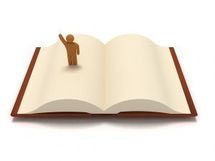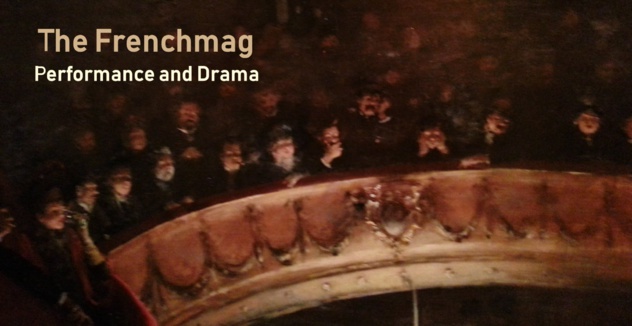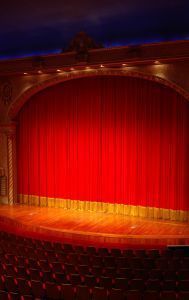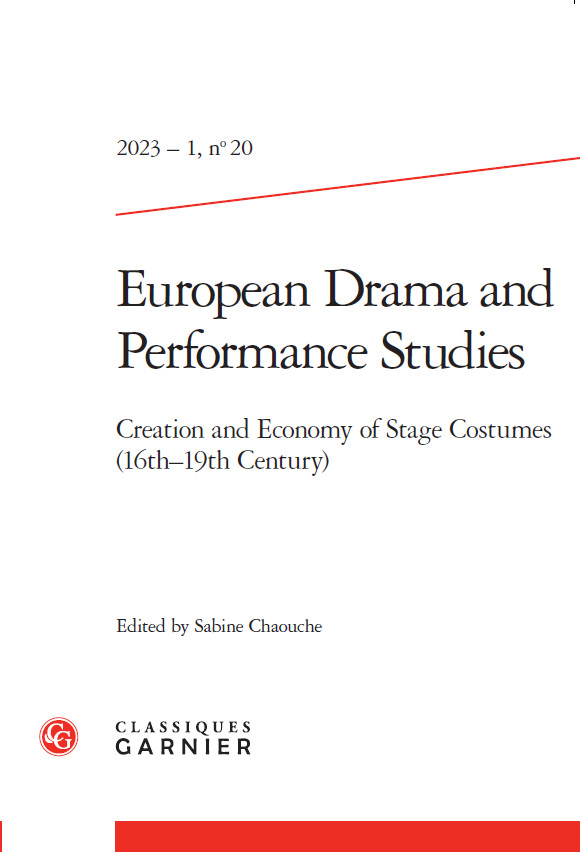
Foire et Commedia dell’arte:
• La Foire : Fair
• Un vaudeville : a song in an opera-comique (une chanson dans un opéra-comique, ancêtre du music-hall). Il ne s’agit pas du genre théâtral qui sera très populaire au 19e siècle.
• Une ariette : une chanson française mêlée à de la musique italienne.
• Un cannevas : description des gestes et structure de la pièce devant être jouée.
• Un lazzo ; des lazzi : lazzi (jeu muet spécifique)
• Les zannis: les serviteurs (the servants)
• La batte d’Arlequin: it is a fake sword (wood). Slapstick (a theatrical prop; it is made out of two thin strips of wood; when Arlecchino hits somebody, the two strips slap against each other, making a sound).
• Tipi fissi (Italian word): types fixes (fixed social types)
Sur le théâtre en général :
• Un billet : a ticket
• La salle : the playhouse
• Une loge : a box
• Loge d’avant-scène : a stage-room
• Un fauteuil : a seat
• L’orchestre, le parterre : the pit
• Le balcon : the gallery
• Le poulailler, le « paradis » : the peanut gallery, « the gods »
• L’avant-scène, le proscenium : the proscenium
• Le manteau d’Arlequin : the proscenium arch
• Le rideau : the curtain
• Le rideau d’entracte : the act-drop
La scène et la salle :
• La représentation : the performance
• La scène, les planches : the stage
• Le plateau : the floor of the stage
• Le trou du souffleur: the prompter’s box
• L’avant-scène : the front of the stage
• L’arrière-scène : the back of the stage
• La toile de fond: the back-drop
• Les coulisses : the wings
• Côté cour : the left-stage
• Côté jardin : the right-stage
• Le décor : the scenery
• Un décor : the set
• La rampe : the footlights
• Une compagnie, une troupe : a theatrical company ; a troupe
• La mise en scène : directing
• Mettre en scène : to direct, to stage
• Monter une pièce: to produce a play
• Distribuer les rôles: to cast a play
• Une répétition: a rehearsal
• Répéter: to rehearse
• Une répétition générale: a dress rehearsal
• Créer un role: to be the first actor to play a given role
• Les mimiques, les grimaces: mimicry
• Un comédien, un acteur, un interprète: an actor
• Une comédienne, une actrice, une interprète : an actress
• Un premier rôle : a leading part
• Un jeune premier : a juvenile lead, leading man
• Une jeune première: a young leading lady
• Une doublure: an understudy
• Un figurant, une figurante: a walker-on
• Remplir un rôle de figurant : to walk on
• Une vedette : a star
• Un cabotin, une cabotine : a ham ; a barn-stormer
• Un décorateur : a stage-designer
• Un régisseur : a stage-manager
• Un accessoiriste : a prop man
• Les accessoires : props
• Les loges (des artistes) : the artists’dressing-rooms
• Le foyer des artistes : the green-room
• Un costumier, une costumière : a wardrobe-keeper
• Le maquillage : the make-up
• Une entrée en scène : the actor’s entrance on stage
• Entrer en scène : to come on the stage
• Le trac: stage fright
• Avoir le trac: to have stage fright
• Un souffleur, une souffleur : a prompter
• Souffler: to prompt
• Le manuscrit, l’exemplaire du souffleur : a prompt-copy
• Le jeu : acting
• Jouer : to play, to act, to perform
• Jeux de scène: stage business
• La réplique: the speech, the lines, the cue
• Donner la réplique : to give the cue
• Manquer la réplique : to miss the cue
• En aparté : aside, in a stage-whisper
• Parler à la cantonnade: to speak some one behind the scenes
• Une tirade: a long speech
• Un rappel: a curtain call
Autres mots de vocabulaire:
• Une affiche : a poster ; a display
• Une pièce de théâtre : a play
• Un entracte : an intermission
• Le public, les spectateurs, l’auditoire, la salle : the audience
• Un échec, un four : a flop
• Un four noir : a dismal flop
• Tomber : to fail
• Jouer devant les banquettes vides: to play in an empty house
• Tenir l’affiche : to have a run
• La recette : the takings at box-office
• Une salle pleine, salle comble: a full house
• La relâche : theatre closed !
• La Foire : Fair
• Un vaudeville : a song in an opera-comique (une chanson dans un opéra-comique, ancêtre du music-hall). Il ne s’agit pas du genre théâtral qui sera très populaire au 19e siècle.
• Une ariette : une chanson française mêlée à de la musique italienne.
• Un cannevas : description des gestes et structure de la pièce devant être jouée.
• Un lazzo ; des lazzi : lazzi (jeu muet spécifique)
• Les zannis: les serviteurs (the servants)
• La batte d’Arlequin: it is a fake sword (wood). Slapstick (a theatrical prop; it is made out of two thin strips of wood; when Arlecchino hits somebody, the two strips slap against each other, making a sound).
• Tipi fissi (Italian word): types fixes (fixed social types)
Sur le théâtre en général :
• Un billet : a ticket
• La salle : the playhouse
• Une loge : a box
• Loge d’avant-scène : a stage-room
• Un fauteuil : a seat
• L’orchestre, le parterre : the pit
• Le balcon : the gallery
• Le poulailler, le « paradis » : the peanut gallery, « the gods »
• L’avant-scène, le proscenium : the proscenium
• Le manteau d’Arlequin : the proscenium arch
• Le rideau : the curtain
• Le rideau d’entracte : the act-drop
La scène et la salle :
• La représentation : the performance
• La scène, les planches : the stage
• Le plateau : the floor of the stage
• Le trou du souffleur: the prompter’s box
• L’avant-scène : the front of the stage
• L’arrière-scène : the back of the stage
• La toile de fond: the back-drop
• Les coulisses : the wings
• Côté cour : the left-stage
• Côté jardin : the right-stage
• Le décor : the scenery
• Un décor : the set
• La rampe : the footlights
• Une compagnie, une troupe : a theatrical company ; a troupe
• La mise en scène : directing
• Mettre en scène : to direct, to stage
• Monter une pièce: to produce a play
• Distribuer les rôles: to cast a play
• Une répétition: a rehearsal
• Répéter: to rehearse
• Une répétition générale: a dress rehearsal
• Créer un role: to be the first actor to play a given role
• Les mimiques, les grimaces: mimicry
• Un comédien, un acteur, un interprète: an actor
• Une comédienne, une actrice, une interprète : an actress
• Un premier rôle : a leading part
• Un jeune premier : a juvenile lead, leading man
• Une jeune première: a young leading lady
• Une doublure: an understudy
• Un figurant, une figurante: a walker-on
• Remplir un rôle de figurant : to walk on
• Une vedette : a star
• Un cabotin, une cabotine : a ham ; a barn-stormer
• Un décorateur : a stage-designer
• Un régisseur : a stage-manager
• Un accessoiriste : a prop man
• Les accessoires : props
• Les loges (des artistes) : the artists’dressing-rooms
• Le foyer des artistes : the green-room
• Un costumier, une costumière : a wardrobe-keeper
• Le maquillage : the make-up
• Une entrée en scène : the actor’s entrance on stage
• Entrer en scène : to come on the stage
• Le trac: stage fright
• Avoir le trac: to have stage fright
• Un souffleur, une souffleur : a prompter
• Souffler: to prompt
• Le manuscrit, l’exemplaire du souffleur : a prompt-copy
• Le jeu : acting
• Jouer : to play, to act, to perform
• Jeux de scène: stage business
• La réplique: the speech, the lines, the cue
• Donner la réplique : to give the cue
• Manquer la réplique : to miss the cue
• En aparté : aside, in a stage-whisper
• Parler à la cantonnade: to speak some one behind the scenes
• Une tirade: a long speech
• Un rappel: a curtain call
Autres mots de vocabulaire:
• Une affiche : a poster ; a display
• Une pièce de théâtre : a play
• Un entracte : an intermission
• Le public, les spectateurs, l’auditoire, la salle : the audience
• Un échec, un four : a flop
• Un four noir : a dismal flop
• Tomber : to fail
• Jouer devant les banquettes vides: to play in an empty house
• Tenir l’affiche : to have a run
• La recette : the takings at box-office
• Une salle pleine, salle comble: a full house
• La relâche : theatre closed !




